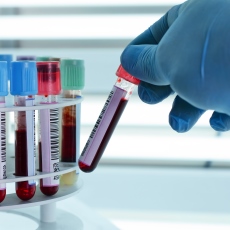
Hormones
New on the MedlinePlus Hormones page:

National Institutes of Health
Hormones are your body's chemical messengers. They travel in your bloodstream to tissues or organs. They work slowly, over time, and affect many different processes, including
- Growth and development
- Metabolism - how your body gets energy from the foods you eat
- Sexual function
- Reproduction
- Mood
Endocrine glands, which are special groups of cells, make hormones. The major endocrine glands are the pituitary, pineal, thymus, thyroid, adrenal glands, and pancreas. In addition, men produce hormones in their testes and women produce them in their ovaries.
Hormones are powerful. It takes only a tiny amount to cause big changes in cells or even your whole body. That is why too much or too little of a certain hormone can be serious. Laboratory tests can measure the hormone levels in your blood, urine, or saliva. Your health care provider may perform these tests if you have symptoms of a hormone disorder. Home pregnancy tests are similar - they test for pregnancy hormones in your urine.
- ACTH (Adrenocorticotropic Hormone) Test (American Association for Clinical Chemistry)
- ADH (Antidiuretic Hormone) Test (American Association for Clinical Chemistry)
- Aldosterone and Renin Test (American Association for Clinical Chemistry)
- Anti-Müllerian Hormone (American Association for Clinical Chemistry)
- Catecholamines, Plasma and Urine Test (American Association for Clinical Chemistry)
- Cortisol Test
 (National Library of Medicine)Also in Spanish
(National Library of Medicine)Also in Spanish - DHEAS Test (American Association for Clinical Chemistry)
- Estrogen Test (American Association for Clinical Chemistry)
- FSH (Follicle-Stimulating Hormone) Test (American Association for Clinical Chemistry)
- Gastrin: The Test (American Association for Clinical Chemistry)
- Growth Hormone (American Association for Clinical Chemistry)
- IGF-1 (Insulin-Like Growth Factor -1) Test (American Association for Clinical Chemistry)
- Insulin Test (American Association for Clinical Chemistry)
- LH (Luteinizing Hormone) Test (American Association for Clinical Chemistry)
- Prolactin Test (American Association for Clinical Chemistry)
- PTH Test (American Association for Clinical Chemistry)
- SHBG (Sex Hormone Binding Globulin) (American Association for Clinical Chemistry)
 Testosterone Levels Test
Testosterone Levels Test  (National Library of Medicine)Also in Spanish
(National Library of Medicine)Also in Spanish- Thyroid Tests: MedlinePlus Health Topic
 (National Library of Medicine)Also in Spanish
(National Library of Medicine)Also in Spanish
- Endocrine Disrupting Chemicals (EDCs) (Hormone Health Network)
- Endocrine Disruptors
 (National Institute of Environmental Health Sciences) - PDF
(National Institute of Environmental Health Sciences) - PDF - Hormones and Hypertension (Hormone Health Network) - PDF
- Obesity (Hormone Health Network)Also in Spanish
- You and Your Endocrinologist (Hormone Health Network)
- Anabolic Steroids: MedlinePlus Health Topic
 (National Library of Medicine)Also in Spanish
(National Library of Medicine)Also in Spanish
- ClinicalTrials.gov: Hormones
 (National Institutes of Health)
(National Institutes of Health)
- Article: Effects of intravenous thyrotropin-releasing hormone on 18F-fluorodeoxyglucose uptake in human...
- Article: Effect of the Duodenal-Jejunal Bypass Liner on Glycemic Control in...
- Article: Predictive value of genetic analysis for pathological complete response to...
- Hormones -- see more articles
- What Is a Pediatric Endocrinologist? (American Academy of Pediatrics)Also in Spanish
- Your Endocrine System (For Kids) (Nemours Foundation)Also in Spanish
- Endocrine System (For Teens) (Nemours Foundation)Also in Spanish
- Low Testosterone and Men's Health (Hormone Health Network)Also in Spanish
- Sexual Health: Testosterone Therapy (Mayo Foundation for Medical Education and Research)Also in Spanish
- hCG Test (Pregnancy Test) (American Association for Clinical Chemistry)
- Headaches and Hormones: What's the Connection?(Mayo Foundation for Medical Education and Research)Also in Spanish
- Hormones, Women and Breast Cancer (Hormone Health Network) - PDF
- Menopause: MedlinePlus Health Topic
 (National Library of Medicine)Also in Spanish
(National Library of Medicine)Also in Spanish - Progesterone Test (American Association for Clinical Chemistry)
- Therapeutic Use of Androgens in Women (Hormone Health Network) - PDF
- Why Is Oral Health Important for Women? (Academy of General Dentistry)
- Human Growth Hormone (HGH): Does It Slow Aging?(Mayo Foundation for Medical Education and Research)Also in Spanish
- Could you have low testosterone? (Medical Encyclopedia)Also in Spanish
- Growth hormone test (Medical Encyclopedia)Also in Spanish
- Luteinizing hormone (LH) blood test (Medical Encyclopedia)Also in Spanish
- Prolactin blood test (Medical Encyclopedia)Also in Spanish
- Serum progesterone (Medical Encyclopedia)Also in Spanish
- Testosterone (Medical Encyclopedia)Also in Spanish



































No hay comentarios:
Publicar un comentario